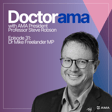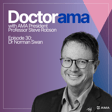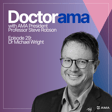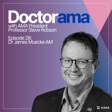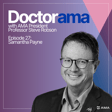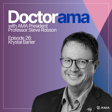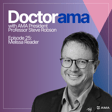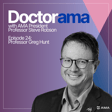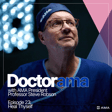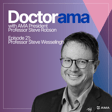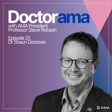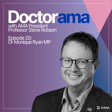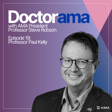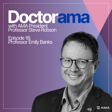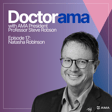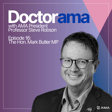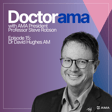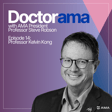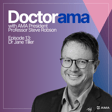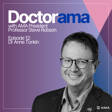Become a Creator today!Start creating today - Share your story with the world!
Start for free
00:00:00
00:00:01

Episode 1 - Dr Sophie Scamps
In episode 1 of Doctorama AMA President Professor Steve Robson chats with Dr Sophie Scamps.
Recommended
Transcript
A GP's Higher Calling
00:00:00
Speaker
Imagine that you're a GP in one of the most idyllic areas of Sydney. You've got loyal patients and your family is very happy. But you're not happy with that. You feel that there's a higher purpose and more you can do for the health of the country and indeed the politics of the country. So you face a choice. Do you give up what you've got or do you stay where you are and always think about the missed opportunity? We're going to find out the choice that was made by our guest today.
00:00:33
Speaker
You're listening to Dr. Rama with Steve Robson, bringing you the best of health, medicine, and people.
Introduction of Dr. Sophie Skomps
00:00:41
Speaker
I guess today is the member for McKellar, Dr. Sophie Skomps. Thank you so much for joining us on Dr. Rama today, Dr. Skomps. Oh, absolutely. My pleasure. Thank you for having me. Do you mind if I call you Sophie, just for the sake of speaking along? Of course. Please call me Sophie. Not detitling you in any way. It just makes it a bit smoother.
00:01:03
Speaker
No, thank you. That'd be great.
From Athletics to Medicine
00:01:05
Speaker
Sophie, thanks for joining us. Before you were a GP, you're an athlete and a very accomplished athlete. And I understand that you're part of a group that has a record that stands to this day. Can you tell me a little bit about that? Yes, I was very lucky. I was involved in athletics from a very young age. I was one of four children. I think my mum thought it was a good idea to get us all out of the house on a Saturday morning. So off we all went down to little athletics.
00:01:32
Speaker
I was fortunate to be quite good at it. I think I surprised myself and competed for Australia in a couple of a couple of occasions and one of them was in the World Junior
00:01:44
Speaker
World Junior Games in 1992 and during that time we four by four hundred meter women's relay team Got the gold medal and we also got the Australian record which still stands and funnily enough Kathy Freeman was in that Larger team, but she wasn't in the four by four relay team.
Studying Medicine at Sydney and Oxford
00:02:02
Speaker
She was still running ones and twos at that stage So we even did it without Kathy
00:02:07
Speaker
Well, that really is quite an incredible achievement. You went on and you graduated in medicine from the University of Sydney, but you also have a science degree from Oxford and you got a master's. Was general practice where you were headed or were you doing some other things and making up your mind? I think I was doing other things, definitely, in making up my mind. And I had a bit of a windy career, we could say.
00:02:35
Speaker
I did have aspirations to do physicians training, but I also absolutely loved my athletics and wanted to be able to get back into my athletics. And then I had a partner that was living away interstate. So all sorts of different things were factored in. And we did make a decision at one point to go and live overseas. And that's when I had the opportunity to both do the master's in public health, which was absolutely wonderful.
00:03:00
Speaker
such an eye opener for me. And then following that, we spent a couple of years in Dublin. My husband was a professional rugby union player.
00:03:07
Speaker
and played over in Dublin for a couple of years. And then following that, we both always had this desire to go and study at Oxford. Just thought it would be a wonderful opportunity. So we gave it a go. Each of us gave it a go. We both got in. And that was an incredible experience as well. Studied a master's of the history of science, medicine and technology. So it was actually a history degree, which is quite incredible. So that must have broadened your horizons on medicine quite a lot.
00:03:37
Speaker
Yeah, I think studying both the Masters of Public Health and the history of science and medicine really broadened my horizons greatly. Just to know that there's much more than just the, you know, that one single person
Career in Australia and Long-term Patient Relationships
00:03:49
Speaker
making a discovery, that it's a much broader movements and changes. And, you know, particularly, you know, we hear a lot about it now, the social determinants of health, but that was really revolutionary for me when I first learned about it, you know, back some 20 odd years ago. Yeah.
00:04:05
Speaker
You came back to Australia and you were working in Narrabend, which I guess is not that far from where you grew up. I think you grew up around the Taramura. That's right. That's right. Yes. But a different electorate now. It's not the electorate that you're actually the member for now. I think it's Bradfield, is it? Yes. So yeah, up on all shore is Bradfield and
00:04:27
Speaker
We had lived in Canberra for a while, but decided we were quite keen to stay in Canberra, but thought if we moved back to Sydney, where would we live? And definitely the Northern Beach was such a beautiful area. It really appealed to us. But yes, I practiced for some years, for several years at Monavale Hospital and North Shore Hospital in emergency and really loved that. But then realized that I wanted that more long-term relationship with my patients and decided to go into general practice.
00:04:57
Speaker
And so I ended up working at Nara Bean and I just feel it was such a wonderful time in my life because it was such a wonderful community and I really felt lucky to be working with those people in such a place as well. So you're right, I was in a very happy place working as a GP in Nara Bean in that community.
00:05:16
Speaker
I imagine looking at the area, I had a look at the map before we got on today and it looks like an area where there are going to be a lot of loyal patients. It's a relatively, I guess, geographically circumscribed area and I guess you got to know your patients really well.
00:05:32
Speaker
Yes, I did. That's why I felt very fortunate. And that's exactly what I wanted out of general practice was to be able to build those longer term trusting relationships with people. So you could really work with them to get the best, you know, working with them to get the best with them. Because if you know somebody, well, you know what they're going to take and what they're, what there's no way they're going to step into. So sort of saying, I know that you're never going to, you know, do this, but how about we try this way and
00:05:57
Speaker
trying to really bring people on that journey or decide that journey, but supporting them. It was such a wonderful, wonderful career. I really, really did love it and just loved my patients as well. It was, yeah, really rewarding.
Shift from GP to Public Health and Climate Change
00:06:12
Speaker
So coming from something that sounds very idyllic, what was it that made you say, well, look, I have a great life. My family has settled here. I'm making a real impact on the community.
00:06:26
Speaker
but there's something more I think I could do. Can you talk me through a little bit about your thought processes? Yes, I always had a niggling in the back of my mind that yes, I was looking after a certain cohort of people, of individuals and families, but I could be doing a lot more just from my background in public health and also with the history of medicine as well. I understood that there's a lot more that I could personally be doing as somebody with this knowledge
00:06:53
Speaker
to make sure the fundamentals were there that really supported people having that sense of well-being and health on a much greater sort of population level than what you can do as a GP. You can do a lot as a GP but just knowing that and I guess one of the triggers for me was just knowing that climate change was coming and there was very little leadership at the federal level on climate change and I just thought
00:07:17
Speaker
we're going to be facing this barrage of climate disasters, you know, housing, job security. All these things are so fundamental to health and the wellbeing of a community and a nation. So that was sort of sitting in the back of my mind, I think for quite some time. So how did you approach this with your husband and your family? Cause this is a big thing to drop on a family. Well, it didn't happen like that. I must say it was very,
00:07:44
Speaker
sort of stepwise journey. And I think what happened first was this sense that of absolute frustration that there was we weren't stepping up when it came to climate change. And so I got to the point in my own life where I decided I needed to do whatever I could in my own life. So that certainly wasn't stepping up to be a candidate as a federal politician. But
00:08:06
Speaker
It was pretty much what I could do in my life and my family's life. And I knew there was a lot of people in the community who felt the same way as I did. So starting to have those conversations with people in my network as well. And it really just started as building a community movement. You know, what can we do in our community? We can do a whole lot better. And we were, we were working with a lot of people to, to decarbonize Avalon and our community and
00:08:34
Speaker
A lot of people were jumping on. I mean, I had thought about this for a long while and I'd sort of suggested to people that maybe we should do something, you know, to act on climate change, maybe even trying to convince other people to take the leadership, you know, step up and lead on certain things. And I had this revelation actually, I had this enormously privileged life. I had this, you know, stable
00:08:56
Speaker
roof over my head start, you know, family life was stable, everything, and stable career. And I've had this, you know, wonderful privilege of this education that I've had actually, and I realized, actually, I should be stepping up. Why isn't it me that stepping up? And when I changed that, sort of the, the rhetoric or the way I was speaking from, we should do something to
00:09:18
Speaker
This is what I'm doing. People's responses change dramatically as well from like, yes, we should be doing something to how can I help you? And that's how it really grew and things started to change. And so it really happened over a few years before I decided to run as a candidate. And I really had to be brought along on that journey quite strongly, I think as well.
00:09:39
Speaker
It started just with advocacy to the different levels of government and then understanding that if our community really wanted to be represented, then we needed to start with listening. And so it came down to following the the voices model, which Kathy McGowan, who's an MP and now Helen Haynes had had undertaken as well, which is really just sitting down
00:10:01
Speaker
around people's kitchen tables and listening to them about what issues are important to them and what solutions they'd like to see. And it all stemmed from there. And a lot of people in these kitchen table conversations were saying, well, we would love to have an independent who will genuinely represent us.
The Move into Politics
00:10:17
Speaker
And they'd say, where are they? And so, well, there isn't one here currently. But it was felt it was came across so often and so broadly that that a friend and I stepped aside again and then started to help build this
00:10:31
Speaker
grassroots movement, just pull it together because you can't create this type of thing. It has to come from the community. We just sort of help facilitate it. And one of my roles was actually looking for the candidate. We thought we probably needed a high profile candidate to get them across the line, but very strongly people in the community just said, no, we don't want a high profile candidate. We want someone who's genuine and passionate about this, who's actually
00:10:55
Speaker
from our community and we'll represent our community. And everyone said, well, why aren't you doing it? And I was like, oh no. So it was a journey. It wasn't as though I flipped it on my family. It was more like, oh my goodness, I think this is going to be me. So it's a big thing to do. Did at any stage you get a sort of an attack of the nerves and think, what have I done here? Did that happen? Oh, hugely. But I think I went through the process beforehand. I think my nerves came before I made the decision
00:11:23
Speaker
I'd sort of say to my husband, do you think I can do this? You know, I'd never really contemplated going into politics like that. But the more I sort of was involved in this whole voices movement, the more it just seemed like a good fit. And the good fit came from the fact that people very broadly across the electorate were feeling that they hadn't been listened to and were taken for granted for a very long time. And, you know, as a GP, one of our
00:11:52
Speaker
you know, and as a doctor, generally, one of the most important things we do is listen and you sit there and listen and you're told don't speak too much at the start of a consultation, you need to listen. Otherwise you're going to miss the diagnosis 100% and you won't know how to work with that patient either. So I think that was a really powerful thing for me. And then the other thing came down to trust. There was such a trust deficit in our politicians and our government and at that time, so the community really did need somebody
00:12:20
Speaker
they could trust and having somebody that
Trust and Integrity in Politics
00:12:22
Speaker
was embedded in the community as a GP is a pretty good place to start, I think. So I'm now not sure where I stand on trust. I was a GP with high level of trust and now I'm a politician. Yeah, you've certainly gone on the trust scale from the top to, we're not going to say the bottom, but that's one of the issues that we are trying to sort of deal with is to build greater integrity into our
00:12:47
Speaker
democracy in our political system and make sure that people are listened to and are hearing from me about how I'm representing them so that people can sort of feel that trust. Yeah. Now, there must be an enormous difference between your practice as a GP and the work that you do now. How would you describe that difference between the way you used to work as a GP and now as a professional politician?
00:13:12
Speaker
Look, it's interesting you asked that, Steve, because I see a lot of similarities as well, very strangely. Who would have thought but...
00:13:19
Speaker
As I was talking about that, that listening being such a powerful component of what I do is just enormously important in this role as well and also being a good communicator, trying to communicate and making sure that people are feeling heard but also hearing from me and understanding it and also communicating in a way that brings people in and being accessible as well.
00:13:44
Speaker
And also, as I said, trying to rebuild that trust. Trust is such an important thing as a doctor as well and bring that professionalism and that trust back into being in this role as a politician. But I did when I first started, I there were a lot of parallels between starting as a
00:14:02
Speaker
a federal MP in, you know, Canberra and Parliament House here in Canberra and starting as an intern, you know, that huge building where you don't know where your way around, there's bells and buzzes going off, there's urgent things happening, there's like 20 things going on at once, you've got a multitask. So there were a lot of similarities and kind of as well thrown in the deep end back in my day when I started, it was a bit like that. So there were a lot of similarities. But I guess there's also a lot of
00:14:30
Speaker
negotiation that goes on as well like finding a way forward finding a solution not just saying this is it take it or leave it you know working with people to find a good way forward finding a solution because you know there's challenges in general practice that we're trying to help people with and solve and there's challenges facing our country again which we want to work towards solving in a really constructive collaborative way
00:14:54
Speaker
Yeah. Well, look, it's lucky you were a GP and not a global surgeon.
Balancing Family and Political Life
00:14:57
Speaker
Then I'm going to, I'm going to finish up here with a couple of questions. It is a big thing for you to spend large blocks of time away from your family in Canberra. Now, how are your family coping with you being away? Look, I would say it was a bit like my family had the rug pulled from under them, but, um, my husband,
00:15:21
Speaker
has always been a hands-on father and he's really stepped up to, you know, taking care of the children. And that's the most important thing, like the house might be in disarray, but as long as the children are sort of getting to where they need to go and feeling cared for, I think that's the main thing. But I have three teenagers, all who have, you know, really important needs. Currently, one's doing the HSC, two are learning to drive.
00:15:46
Speaker
It's an important time in their lives, but yeah, it's a big change because I am away from home as well, but I need to get that ballot. It's been a very, very busy year and I think my next focus is trying to get some more time where I do have just time out with the family. I've got teenagers as well and I get a lot of feedback about my performance. Do you get some feedback and is it positive from your kids?
00:16:11
Speaker
Oh, my kids are wonderful actually, particularly during the campaign. Like they're just saying, doing great mum, great job mum, you know, going really well. And it really was important to me, you know, it was really, I was like, yeah, because actually the reason I was doing it was for them, for them because I wanted to build that, you know, safe future for them and other children, but also so they would know and other people would know that somebody
00:16:35
Speaker
like what I consider myself an ordinary normal person would be able to step up into one of these roles and that absolutely anyone can aspire to that type of role as well. And it should be like that. Yeah, absolutely. Look, Sophie, thank you so much for giving up your time to talk to me on Dr. Rama this afternoon. I'm hoping that we can catch up and talk again. There are plenty more things I'd like to chat to you about. But as it is, thank you so much for giving up your time and look forward to seeing you around the Parliament House.
00:17:04
Speaker
Lovely speaking with you, thank you.
